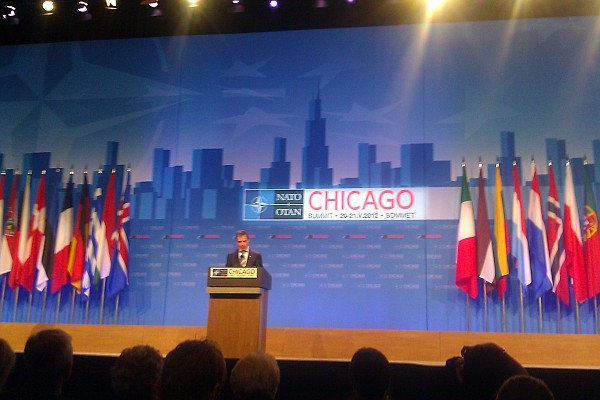
Sorry, cell-phone pic. Real camera discharged, may have something to do with shooting for seven straight hours yesterday.
While protests went from tense to violent outside McCormick Place, NATO secretary general Anders Fogh Rasmussen briefly addressed the media, mostly reiterating what he said this morning, with a few more details, such as the purchase of five unarmed drones by NATO—no discussion as to where they will be deployed yet as part of the smart defense pitch.
One of the minor themes in advance of the summit has been whether NATO has any plans, in the wake of its intervention in Libya, to do the same in Syria. In February, Rasmussen said NATO will not intervene there. Rasmussen reiterated this stance today:
Let me stress that we are very much concerned about the situation in Syria. But NATO has no intention whatsoever to intervene in Syria. I do believe that the best way forward, the best platform for finding solutions is the Annan plan, and we strongly regret that it seems that the Syrian leadership does not comply with the Annan plan, and we strongly condemn the behavior of the Syrian security forces and the crackdown on the civilian population.
Rasmussen also told Russia, which has been prickly about NATO's European missile defense plan—"at our last summit in Lisbon we agreed to create a NATO missile defense system, today in Chicago we have declared that a reality… we call this a 'interim capability'"—to chill.
That cannot be blocked by Russia. It is a NATO decision. Having said that, we invite Russian to cooperate on missile defense, and this invitation still stands. We will continue our dialogue with Russia. And I hope that at a certain stage it is in our best interest to cooperate on missile defense…. I do believe the Russians would then realize the Russian population is also threatened by potential missile attacks.
One of the bigger domestic questions is how much of the NATO bill America pays (about 75 percent), and what NATO will do if the economy and political sentiment forces defense cutbacks. Asked if NATO had gotten word either way, he fell back on the efficiency of Smart Defense. Austerity also raises the specter that NATO won't be able to fully fund the Afghan Security forces. Rasmussen said NATO wouldn't come out of the Chicago summit with a figure on how much aid will be available, but expressed confidence that NATO would hit its target of $4.1 billion euros a year.


